Pink Hearts
Posted on Jul 15, 2017 (last modified Aug 8, 2021)

Image by rawpixel.com
Momma cranked the car window down with one hand and spun the steering wheel frantically with the other.
I was eleven years old and hadn’t hit puberty yet, so the g-force of the turn slid my tiny body clear across the backseat behind Momma. Fresh air was now blowing out the sour stench of acidic bile from my sister’s stomach — a mop-water musk from the afternoon rain now softening the taste of vinegar that had been invading my throat. I sat up and stabled myself in the corner of the backseat and with both arms rigid, I watched little pink hearts drip slowly off the upholstery from the roof of the car and onto my sister’s head. She leaned drunkenly, thunked against the passenger window, and then slid forward, leaving a trail of dark, wet hair in her pink vomit on the glass.
“Dammit, Dawn!” Momma yelled, her head turning from the road to my sister and back. She reached over and pushed my sister’s limp body up against the seat. Brushed some hair behind my sister’s ear to get a better look at her face, which was pale, and her lips, which were blue.
“What were you thinking, dammit? What the hell were you thinking?”
The little pink hearts in my sister’s wet hair looked like candy to me. Sort of like the kind we passed around in class on Valentine's day. You know, the kind with little messages printed on them like HUG ME, LOVE YOU, XOXO and BE MINE. But one look at Momma’s eyes in the rearview mirror assured me it was no box of candy that my sister had swallowed.
“Where are we going, Momma? To the hospital?”
“Emergency room. Yes! We’ve got to get her stomach pumped now!”
Momma was a Licensed Vocational Nurse, she knew what to do.
My sister was thirteen years old and she survived it, but to this day, I don’t know why she did it.
I was too young to understand much, but today I know that pieces of her own heart were mixed up with all those little speed pills, or whatever they were. Something got fractured that day and the fissure, I think, just kept on growing from then on out. I watched over time as the weight of a thousand little things stuck to her like used up chewing gum from young boys in line for a ride at a theme park. She carried the weight of all that glop on her bones and it eventually brought her to her knees.
In the hospital, years later, I rubbed lotion into the course and cracked skin on the bottom of her feet. At some point, they started swelling, so she had stopped wearing shoes.
“If something happens to me, will you look out for my boy?” she asked. I just casually shook my head with a “pffft” and said, “Sure. Whatever.” And then on my way out the door that evening, she stopped me.
“No, wait!” she said. “I’m serious. I really need you to promise. I want you to look out for him. You.”
I should have asked her then about that day with the pink hearts because I always wanted to know. Why did you do that? What happened?
I’ll never know.
When I received her ashes in a black plastic box, I held a handful tight in my palm and thought about that weird scene in Cheryl Strayed’s memoir, Wild: A Journey from Lost to Found.
“I put her burnt bones into my mouth,” she wrote about her mother, “and swallowed them whole.”
I poured my sister’s ashes back into the bag within the box and then dusted the residue slowly and carefully off my palm and fingers. When I read the verdict on the coroner's report, it made sense to me. It was her heart, most probably, the coroner wrote in a sort of medical way. It gave out, early.
Of course it did.
What was left of it, anyway. Broken a hundred times, battered, bruised, and swollen large and yet still then given, and given, and given all away.
Much of it to me, I think. So much of it to me.
In Strayed’s brilliant novel, after a cathartic and solitary journey along the Pacific Coast Trail, she lay down in the place where she’d poured her mother’s ashes and told her mother it was okay. She had surrendered. That since her mother died, everything had changed. Things she could not have imagined and would never have guessed. She had lived a very troubled life and had ventured down many dark paths, but had been lucky enough to survive long enough to eventually find the light.
“My words came out low and steadfast,” Cheryl wrote. “I was so sad it felt as if someone were choking me, and yet it seemed my whole life depended on my getting those words out.”
“She would always be my mother, I told her, but I had to go. She wasn’t there for me in that flowerbed anymore anyway, I explained. I’d put her somewhere else. The only place I could reach her. In me.”
Well said, Cheryl Strayed. “In me,” indeed.
Thank you for reminding us that our hearts are not entirely our own.